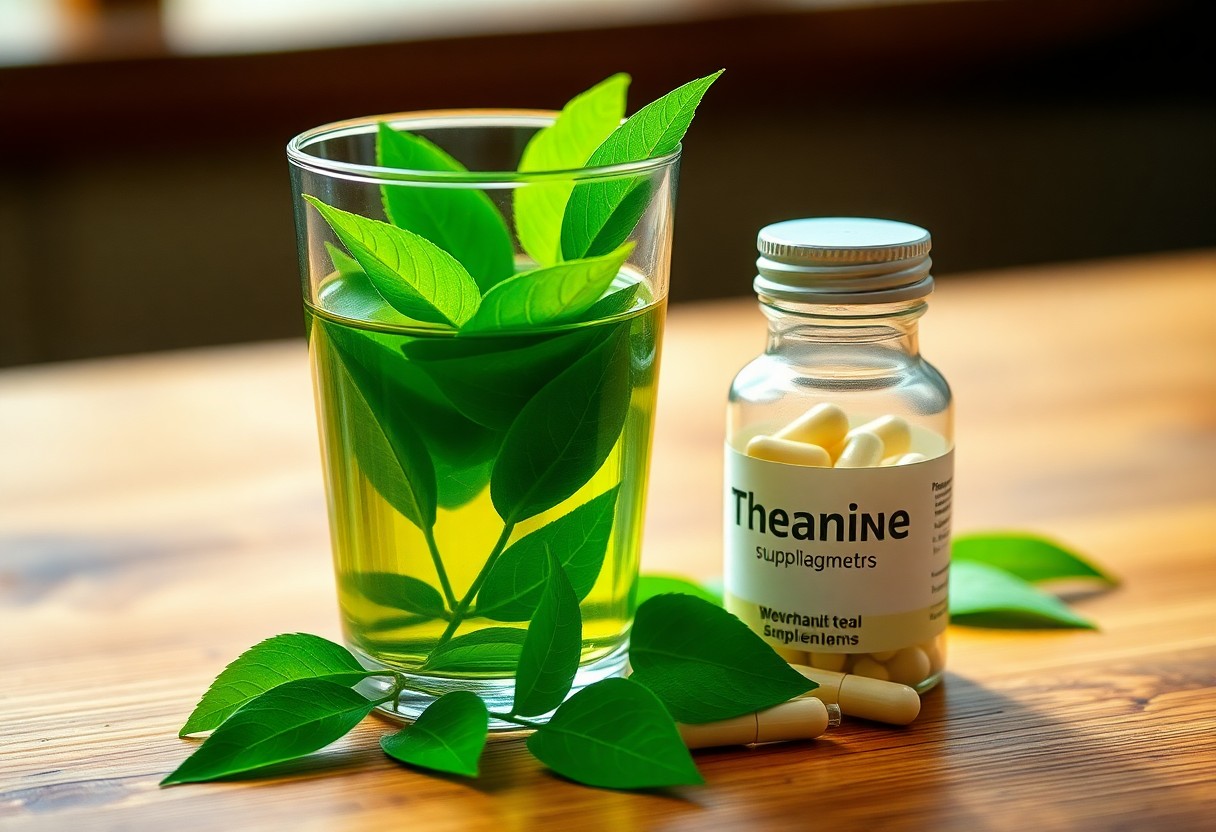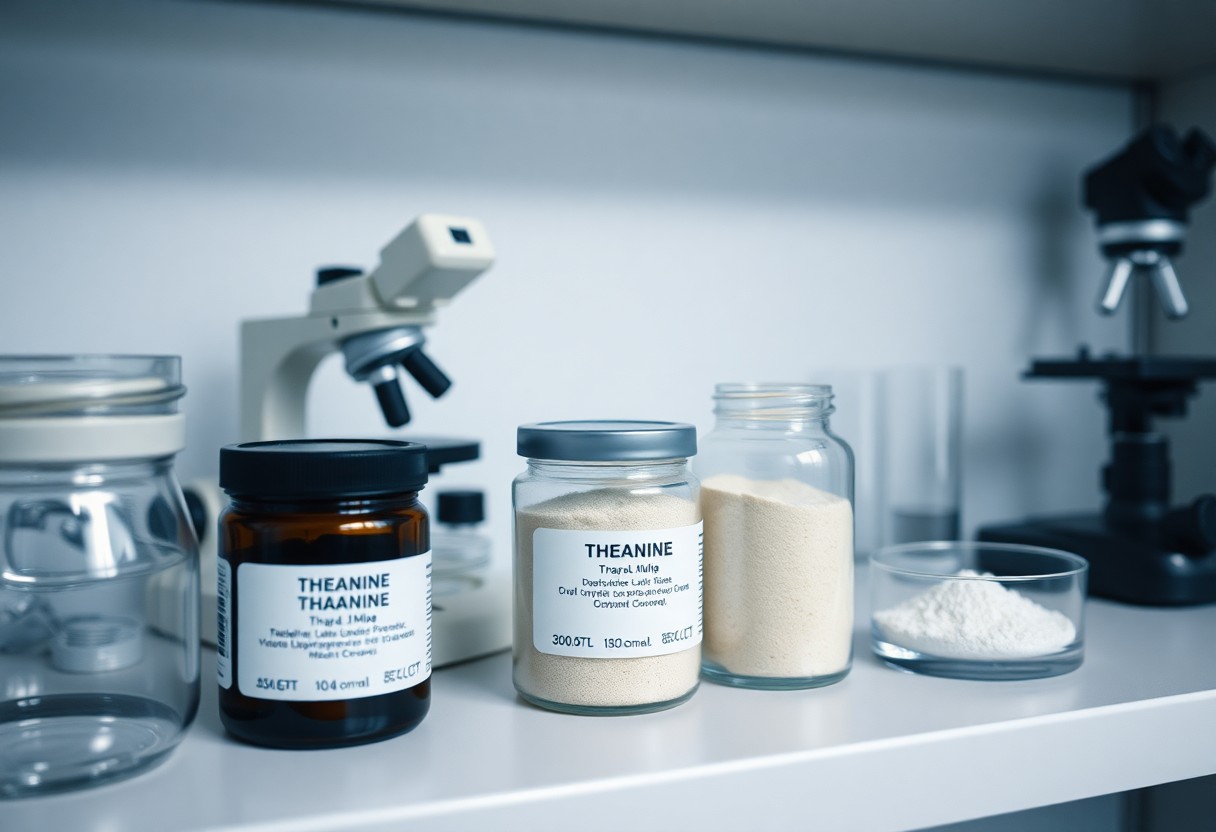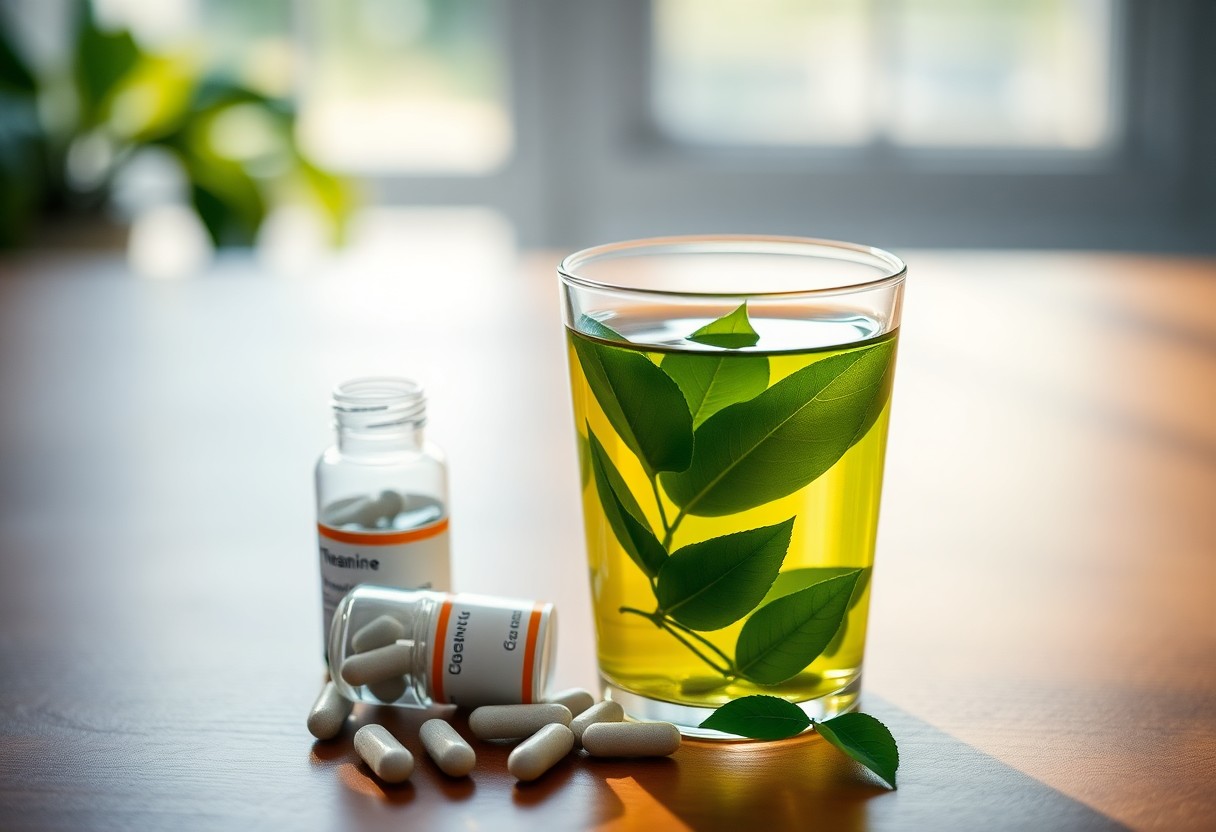You might have heard about the potential benefits of theanine supplements, particularly in relation to relaxation and focus. This amino acid, primarily found in green tea, has garnered attention for its ability to promote calm without drowsiness. In this post, you will explore the effectiveness of theanine supplements, delving into scientific studies, recommended dosages, and potential side effects, helping you make informed decisions about incorporating this supplement into your wellness routine.
Key Takeaways:
- Theanine supplements, primarily derived from green tea, are known for their calming effects and may help reduce stress and anxiety.
- Research suggests that theanine can enhance focus and attention, particularly when taken in conjunction with caffeine.
- Unlike many other supplements, theanine does not usually cause sedation, making it a suitable option for improving relaxation without drowsiness.
- Theanine is generally considered safe with few side effects, though it’s important to consult a healthcare provider before starting any new supplement.
- While many users report positive effects, individual responses to theanine can vary significantly, and more research is needed to fully understand its efficacy.

Unlocking the Neurotransmitter Connection: How Theanine Works
Understanding how theanine interacts with your brain is key to appreciating its benefits. Theanine increases levels of GABA, dopamine, and serotonin—neurotransmitters that play a vital role in mood regulation and relaxation. This action promotes a state of calmness without inducing drowsiness, enabling you to maintain focus while alleviating stress. By creating a balanced neurotransmitter environment, theanine enhances cognitive function and emotional well-being, making it a powerful supplement for overall brain health.
The Role of Theanine in Brain Chemistry
Theanine impacts brain chemistry by promoting a unique balance of neurotransmitters. Not only does it elevate levels of calming neurotransmitters like GABA, but it also enhances dopamine and serotonin. This dual effect helps create a harmonious state where relaxation doesn’t compromise alertness, allowing your mind to function optimally during stressful situations.
Synergy with Caffeine and Other Compounds
A fascinating aspect of theanine is its synergy with caffeine and other compounds, making it a popular choice among those who enjoy stimulating beverages. When combined, theanine can mitigate the jittery effects of caffeine while enhancing cognitive performance. This combination results in a smoother, more focused energy experience, which can be particularly beneficial during study sessions or intense work periods.
Research shows that pairing theanine with caffeine improves attention and cognitive performance more effectively than either compound alone. For example, a study published in the journal “Nutritional Neuroscience” found that participants who consumed a combination of caffeine and theanine exhibited enhanced mental clarity and reaction times compared to those who took caffeine alone. This synergy not only makes the experience enjoyable but also provides a sustainable energy boost that can help you power through tasks while remaining calm and focused.

Navigating the Scientific Landscape: Evidence of Theanine’s Efficacy
The exploration of theanine’s efficacy is backed by a growing body of scientific literature, with numerous studies shedding light on its potential benefits. Research has focused on various aspects of mental health, including stress reduction, cognitive enhancement, and neuroprotection. By delving into controlled trials and observational studies, you can better understand how these findings reflect the real-world effects of theanine supplementation on your well-being.
Key Studies Supporting Theanine’s Benefits
Potential Limitations and Contradictory Findings
Real-World Applications: Who Can Benefit from Theanine Supplementation?
Individuals across various lifestyles and age groups can reap the benefits of theanine supplementation. Whether you’re a busy professional seeking stress relief, a student needing enhanced focus, or someone experiencing sleep disturbances, theanine may provide the support you need. Its versatile effects enable it to serve multiple purposes, making it a valuable addition to your wellness routine. By targeting specific needs, theanine can help improve overall well-being and daily performance.
Target Populations: Stress Relief, Focus, and Sleep
Healthcare professionals often recommend theanine for those wrestling with stress, anxiety, or sleep issues. Students cramming for exams might benefit from its ability to enhance focus and cognitive performance without the jitters associated with caffeine. Additionally, individuals facing chronic stress or insomnia can find solace in the calming effects of theanine, promoting relaxation and more restorative sleep patterns.
Dosage and Timing: Optimizing Theanine Intake for Your Lifestyle
Finding the ideal dosage and timing of theanine is key to maximizing its benefits. Most research suggests a typical dose ranging from 100 to 400 mg per day. For stress relief and focus, taking theanine in the morning or during high-pressure situations can be effective, while a dose before bedtime may enhance your sleep quality. Adjusting your intake timing to align with your daily routine can help you experience the most significant effects.
When considering dosage, start with a lower amount, such as 100 mg, and observe how your body responds. As you become accustomed to theanine, you can gradually increase the dosage as needed. Timing can also be tailored to suit your schedule; some people prefer taking it an hour before stressful events or exams, while others might find it more beneficial as part of their evening routine for improved sleep. Experimenting with these variables will help you discover your optimal way to integrate theanine into your daily life, enhancing your focus and relaxation when it matters most.
The Marketplace Mystery: Quality and Purity in Supplement Choices
Navigating the supplement market can feel overwhelming, particularly with the sheer volume of available theanine products. Ensuring that you’re choosing a high-quality supplement is key to experiencing its benefits fully. Look for third-party testing certifications, which indicate that the product has undergone rigorous analysis for purity and potency. Brands that prioritize transparency in sourcing and manufacturing are likely to offer higher standards. Investigating user reviews and checking for any recalls or legal issues will further assist you in making an informed choice.
Evaluating Theanine Supplement Brands
When considering theanine supplements, it’s beneficial to assess the brand’s reputation, ingredient sourcing, and manufacturing practices. Look for established companies known for their commitment to quality, and favor those that use bioavailable forms of theanine. Investigate whether they conduct clinical trials or publish their research results, as this demonstrates a dedication to efficacy and safety. Checking for customer testimonials can also provide insight into the effectiveness and reliability of a particular brand’s product.
Recognizing Red Flags: What to Avoid
Caution is necessary when selecting a theanine supplement, as some brands may cut corners. Avoid products with exaggerated health claims, as reputable companies will refrain from promising unrealistic results. Unclear labeling, lack of ingredient transparency, or absence of third-party testing are additional red flags. Be wary of products that contain unnecessary fillers, additives, or artificial ingredients. Additionally, overly low prices might hint at compromised quality, and it’s best to invest in a supplement that reflects fair value for its purity and effectiveness.
Specific examples to be wary of include supplements marketed as “miracle cures” for conditions like anxiety or sleep disorders. Such claims often lack scientific backing and can be misleading. If a product lists a proprietary blend without specifying the amounts of individual ingredients, it might indicate that the manufacturer is obscuring details to mask lower-quality ingredients. Always prioritize products from companies that exhibit transparency and accountability, as these behaviors can signal a commitment to your health and well-being.
The User Experience: Testimonials and Anecdotal Evidence
Real-world experiences often reveal a wealth of insights about the efficacy of theanine supplements. Users frequently share stories about enhanced focus during challenging tasks, improved relaxation without drowsiness, and a better overall sense of well-being. Many report that combining theanine with caffeine significantly mitigates jitters while amplifying cognitive performance, leading to a more productive day. These narratives highlight the personal impact of theanine, portraying it as a versatile tool for managing stress and enhancing mental clarity.
Positive Outcomes: Success Stories from Users
Countless individuals sing the praises of theanine, citing transformative effects on their daily lives. Users have mentioned improvements in sleep quality, increased concentration during long work sessions, and even reduced anxiety in social situations. One user noted how incorporating theanine into their morning routine helped maintain calmness throughout hectic days, allowing for clearer decision-making and multitasking. Such stories collectively paint a picture of theanine as a supportive ally in navigating daily challenges.
Common Skepticism and Critiques
Despite numerous positive accounts, skepticism surrounds the effectiveness of theanine supplements. Some critics argue that the evidence supporting its benefits is primarily anecdotal, lacking rigorous scientific backing. Others feel that individual responses to supplements can vary widely, leading them to question whether the positive outcomes reported by some users could be attributed to the placebo effect rather than the supplement itself.
This skepticism raises important points about the variability of supplement effects. While many have shared positive anecdotes, others emphasize the need for more substantial clinical trials to substantiate these claims. The lack of comprehensive studies and standardized dosing protocols means that responses can differ; effective results for one person may not translate to another. Additionally, potential side effects or interactions with other substances can further muddy the waters, causing some users to remain cautious about their reliance on theanine. Engaging with these critiques offers a more balanced understanding of theanine’s role and effectiveness in your wellness journey.
Conclusion
Presently, Theanine supplements can be an effective addition to your wellness routine, particularly if you are seeking to reduce stress and improve focus. Research indicates that these supplements may enhance relaxation without sedation, making them suitable for use during the day. However, individual responses may vary, so it’s important to assess how it impacts your body and consult with a healthcare professional before incorporating them into your regimen. By doing so, you can make informed decisions that align with your health goals.
FAQ
Q: What is Theanine, and how does it work as a supplement?
A: Theanine is an amino acid primarily found in tea leaves, particularly green tea. It is known for its calming effects and is believed to promote relaxation without causing drowsiness. Theanine works by increasing the production of certain neurotransmitters in the brain, such as serotonin, dopamine, and GABA, which are associated with mood regulation and anxiety reduction. Many people take Theanine supplements to help alleviate stress and improve focus, often in combination with caffeine.
Q: How effective are Theanine supplements for reducing anxiety?
A: The effectiveness of Theanine supplements for reducing anxiety varies among individuals. Research suggests that Theanine can help lower stress and anxiety levels, especially in situations that require mental focus and concentration. Some studies have shown that doses of 200-400 mg can lead to significant reductions in stress and improved overall well-being. However, the response can differ from person to person, so results may not be the same for everyone.
Q: Are there any side effects associated with Theanine supplements?
A: Theanine is generally considered safe for most people when taken in appropriate doses. Common side effects might include mild headaches or digestive discomfort in some individuals. It is important to consult with a healthcare professional before starting any new supplement, especially if you have existing health conditions or are taking medication, to ensure there are no potential interactions or complications.
Q: How should I take Theanine supplements for the best results?
A: For optimal effectiveness, Theanine supplements can be taken in doses ranging from 100 mg to 400 mg per day, depending on personal needs and tolerance. Many users find it beneficial to take Theanine approximately 30 minutes to one hour before a stressful event or when they need to concentrate. It’s advisable to take Theanine on an empty stomach for better absorption, but this can vary, so starting with lower doses and observing how your body reacts is recommended.
Q: Can Theanine supplements enhance my cognitive performance?
A: Theanine has been shown to enhance cognitive performance, particularly when combined with caffeine. Studies have indicated that Theanine may improve attention and focus, especially during tasks that require sustained mental effort. The calming effects of Theanine help counterbalance the stimulatory effects of caffeine, potentially leading to improved task performance without the jitters often associated with caffeine consumption alone. However, individual results can vary, so it is important to assess your own response.

